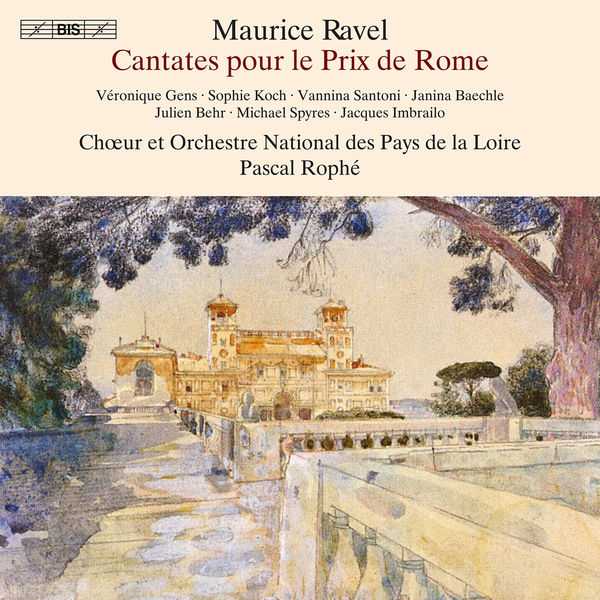

Composer: Maurice Ravel
Performer: Véronique Gens, Vannina Santoni, Sophie Koch, Janina Baechle, Julien Behr, Michael Spyres, Jacques Imbrailo, Clarisse Dalles, Mathys Lagier
Orchestra: Orchestre National Des Pays de La Loire
Conductor: Pascal Rophé
Number of Discs: 2
Format: FLAC (tracks)
Label: BIS
Catalogue: BIS2582
Release: 2022
Size: 1.71 GB
Recovery: +3%
Scan: yes
CD 01
Alyssa, M. 38
01. Prélude
02. I. Elfes légers, elfes errants
03. II. Ma beauté, ma lumière
04. III. Le barde, porte-glaive !
Alcyone, M. 34
05.Prélude
06. I. à l’horizon, les blanches voiles
07. II. Description symphonique
08. III. Ah ! Dieux puissants !
09. IV. Mon aimé ! Mon aimé !
10. V. Ma fille, mon enfant !
Myrrha, M. 29
11. Prélude
12. I. Me voici seul enfin !
13. II. Ainsi qu’un signal
14. III. Tu ne passeras pas, ô roi
CD 02
01. L’aurore, M. 45
02. La nuit, M. 33
03. Les Bayadères, M. 25
04. Matinée de Provence, M. 37
05. Tout est lumière, M. 28
Between 1803 and 1968, the Grand Prix de Rome marked the zenith of composition studies at the Paris Conservatoire. In Maurice Ravel’s time the competition included an elimination round (a fugue and a choral piece) followed by a cantata in the form of an operatic scena. The entries were judged by a jury which generally favoured expertise and conformity more than originality and Ravel’s growing reputation as a member of the avant-garde was therefore hardly to his advantage, and may explain why he never won the coveted “Premier Grand Prix”, and the three-year stay at Rome’s Villa Medici that went with it.
The present recording brings together all the vocal works that Ravel composed for the Prix de Rome – five shorter settings for choir and orchestra and three cantatas, each with three characters taking part in a plot which followed a more or less fixed sequence of introduction, recitative and aria, a duet, a trio and a brief conclusion.
First published more than half a century after Ravel’s death, these test pieces for the Prix de Rome have never acquired the popularity of his other early works, such as Pavane pour une infante défunte, Jeux d’eau or the String Quartet. They are worth more than their reputation as academic exercises might suggest, however, and deserve to be better known, especially when performed by Orchestre National des Pays de la Loire and Pascal Rophé and a team of vocal soloists including Véronique Gens and Michael Spyres.